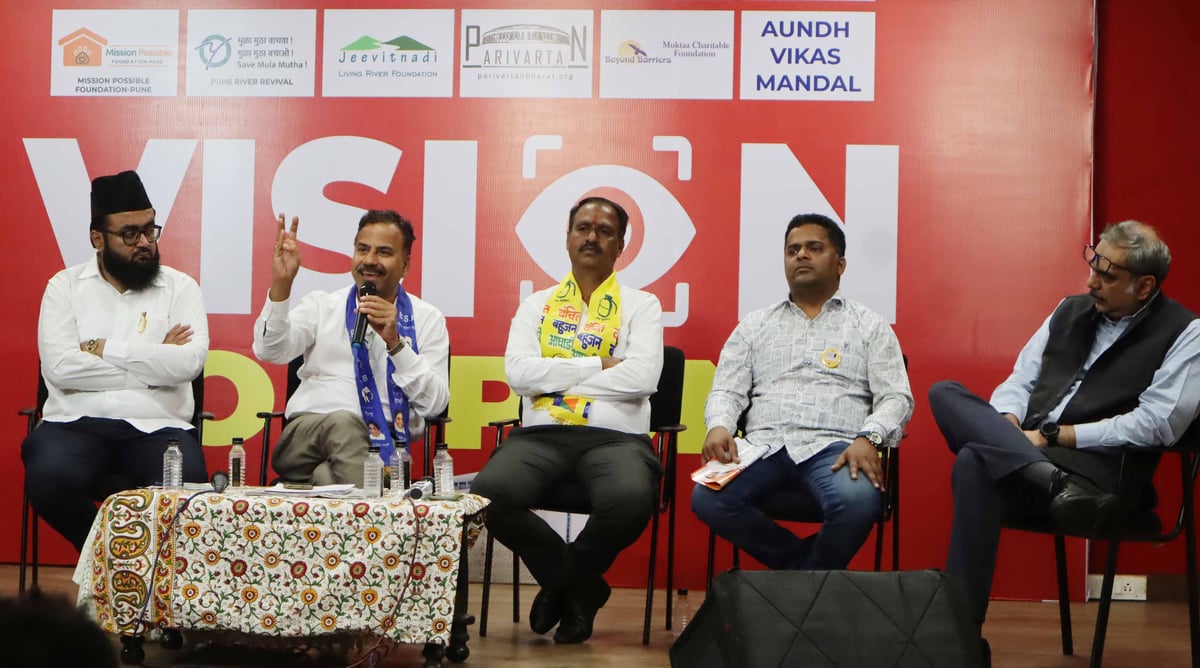FPJ’s Pune Vision 2024: Candidates from Prahar, VBA, BSP, and Independent Voices Address Inequalities, Lack of Resources, and Development Gaps |
As the 2024 elections approach, candidates from Prahar, Vanchit Bahujan Aghadi (VBA), Bahujan Samaj Party (BSP), and independent voices came together to discuss the critical issues facing their constituencies in Pune. These leaders highlighted a range of challenges, from the stark inequality between slums and high-rise areas to the lack of basic infrastructure and services in growing urban neighborhoods.
Zubair Memon, a Prahar candidate for Hadapsar, spoke candidly about the deep-rooted disparities within his constituency, which spans both posh locales like Magarpatta and Amenora, and struggling areas such as Kondhwa, Sayyadnagar, and Undri. He expressed concerns about the neglect of these areas, which are home to SC, ST, OBC, and Muslim communities, pointing to illegal constructions and political corruption as the main obstacles to development.
Memon shared a personal story about being attacked last week by individuals linked to the NCP, a violent incident he claims went largely unreported by mainstream media. He voiced frustration over how the media’s lack of coverage has hindered his ability to make his case to the government and highlight the needs of his community.
BSP’s vision for Wadgaon Sheri
Sudeep Gaikwad, representing BSP’s Hulgesh Chalwadi from Wadgaon Sheri, underscored the dire conditions in the city’s slums, where residents face inadequate housing, poor s.tation, water shortages, and severe traffic issues.
Gaikwad took the opportunity to address the systemic caste bias prevalent in the political landscape. He spoke passionately about the legacy of Mayawati, who, she said, had made significant strides in advocating for the rights of Dalits, OBCs, and other marginalized groups, including pushing for private sector reservations. He criticized the media for downplaying Mayawati’s contributions, particularly her efforts to uplift marginalized communities. Gaikwad also lamented the government’s divide-and-rule approach, which she argued has weakened the SC, ST, and OBC communities by creating divisions within them. He called for unity to ensure a stronger political voice and greater electoral success.
VBA’s vision for Wadgaon Sheri
Meanwhile, Vivek Londhe of VBA, also from Wadgaon Sheri, described his constituency’s challenges, which mirror those of Hadapsar, with a mix of slums and upscale areas. Londhe highlighted the persistent waterlogging issues that residents face every morning, with streets flooded and drainage systems clogged. Students are forced to wade through filthy water each day, and the situation remains unresolved despite promises from local authorities. Londhe also stressed the deteriorating state of public schools in his area, expressing concern that they might close due to neglect, forcing parents to turn to expensive private institutions that many cannot afford.
He pledged that he would push for free education from kindergarten to post-graduation, in line with the vision of Dr. Ambedkar, and called out the corrupt nexus between the BJP, Congress, and contractors for stalling me.ngful progress in these areas.
Londhe emphasized the necessity of tackling waterlogging, improving drainage, and providing better health facilities, such as a hospital similar to Sassoon in his constituency, to address the healthcare vacuum. He also criticized the political and builder-officer nexus that, according to him, has been impeding real progress.
Why I chose AC…
Sachin Siddhe, an independent candidate from the Chinchwad area, provided a unique perspective on why he chose the air-conditioner (AC) as his election symbol, representing the tech community in Pune. He spoke about the high stress levels faced by tech workers, who often work in air-conditioned offices under immense pressure, noting that both IT and ACs can’t be separated. He spoke about wanting to “reduce the temperature” not just in offices but also in the political climate, referencing the rising political temperature in the run-up to elections. “That is why I chose AC as my symbol,” he said.
Siddhe also noted the need for a more integrated approach to urban planning, calling for a single-window system to address the city’s traffic, water, and flooding problems.
On the issue of encroachments, Siddhe suggested that reserved spaces should be set aside for people who have built homes in unauthorized areas, offering a pragmatic solution to this longstanding problem.
The candidates un.mously agreed on the urgent need to address issues like health, water, drainage, and education in their constituencies. They voiced frustration at the lack of action on these issues by the current political establishment and promised to work toward providing practical solutions that would benefit the city’s most vulnerable residents.
They also pointed out the role of the media in shaping public opinion, with many candidates feeling that their efforts and voices were being sidelined in favor of more prominent political narratives.

